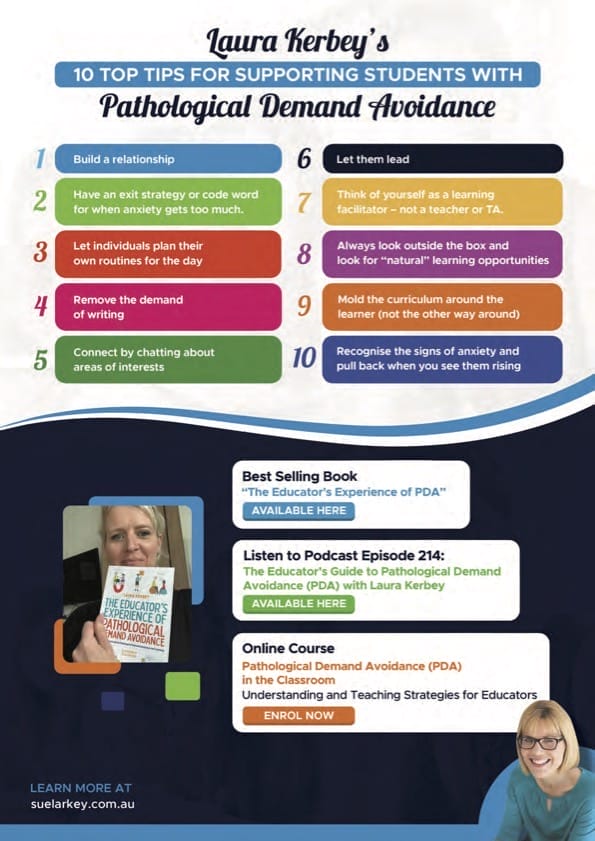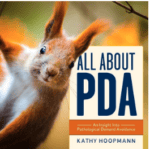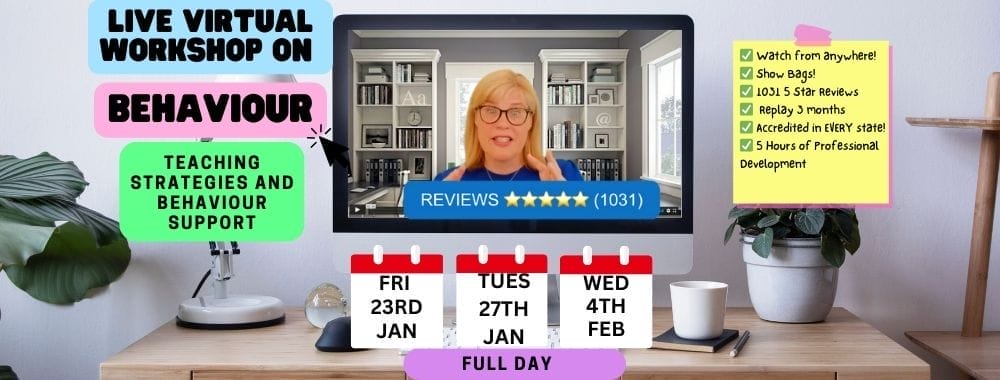Helping PDA Teens Thrive: A Guide for Parents & Educators
Helping PDA Teens Thrive

✅ Show genuine interest in a teen’s interests without an agenda
✅ Use the “GPS” approach: stay calm and redirect without reacting to anger
✅ Offer choices and suggestions rather than direct commands
✅ Provide “get out” options for social situations to reduce anxiety
✅ Use various communication methods (e.g., Zoom, email, voice notes) to accommodate preferences
✅ Create a safe space for honest feedback and expression
✅ Avoid making assumptions based on past behaviors or interests
✅ Stay steady and consistent in your support, even when faced with challenging behaviors
✅ Recognize and respect the need for autonomy in PDA teens
✅ Educate extended family and professionals about PDA to create a supportive network
Pathological Demand Avoidance (PDA) in the Classroom: Understanding and Teacher Strategies for Educators
Download ‘Laura Kerbey’s 10 top tips for supporting students with pda’

Understanding and Connecting with Pathological Demand Avoidance Learners
During Laura Kerbey’s time teaching autistic children, she had a sudden realisation that those with Pathological Demand Avoidance (PDA) are children like no other!
None of her tried and tested autism strategies would work to help them focus or learn and most of her time was spent wondering, what am I doing wrong?
If you feel the same, this short, Laura’s Book is your go to guide to teach you everything you need to know from one educator to another.
With an introduction to what PDA is followed by PDA tailored advice on how to connect with your student and create an autonomous, spontaneous environment that is personalised for you both, this guide is here to ensure that you and your PDA student thrive!
Illustrated by the popular Eliza Fricker and packed with entertaining anecdotes (including one about Jabba the Hut’s poo), this go-to-guide contains everything you need to start implementing PDA friendly learning to help you connect with your student and help them make the most of their learning experience.

Learning about PDA
Learn more about PDA with this Podcast -> https://suelarkey.com.au/learning-about-pda/
Great Resources to Understand and Support children with PDA
-
The Red Beast
$45.95 -
Super Shamlal – Living and Learning with Pathological Demand Avoidance
$45.95 -
Collaborative Approaches To Learning For Pupils With PDA
$40.95 -
The Defiant Child: A Parent’s Guide to Oppositional Defiant Disorder
$30.95 -
Can I tell you about Pathological Demand Avoidance syndrome?
$31.95 -
Red Beast Anger Workbook
$48.95 -
Can’t Not Won’t. A Story about a child who couldn’t go to School
$42.95 -
The Educator’s Experience of Pathological Demand Avoidance An Illustrated Guide to Pathological Demand Avoidance and Learning
$45.95 -
All About PDA
$37.95
















 Sorry we no longer ship items outside Australia. Please consider the digital versions of Sue’s Books –
Sorry we no longer ship items outside Australia. Please consider the digital versions of Sue’s Books – 